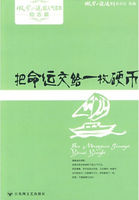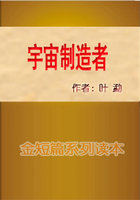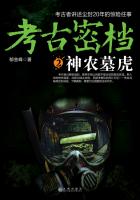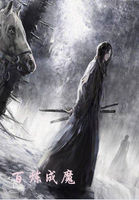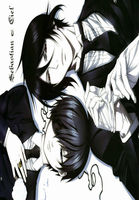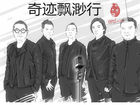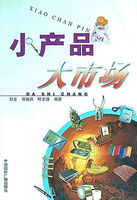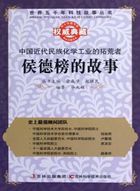SCHOOL began in earnest next day. A profound impression was made upon me, I remember, by the roar of voices in the schoolroom suddenly becoming hushed as death when Mr. Creakle entered after breakfast, and stood in the doorway looking round upon us like a giant in a story-book surveying his captives.
Tungay stood at Mr. Creakle's elbow. He had no occasion, I thought, to cry out'Silence!'so ferociously, for the boys were all struck speechless and motionless.
Mr. Creakle was seen to speak, and Tungay was heard, to this effect.
'Now, boys, this is a new half. Take care what you're about, in this new half. Come fresh up to the lessons, I advise you, for I come fresh up to the punishment. I won't flinch. It will be of no use your rubbing yourselves; you won't rub the marks out that I shall give you. Now get to work, every boy!'
When this dreadful exordium was over, and Tungay had stumped out again, Mr. Creakle came to where I sat, and told me that if I were famous for biting, he was famous for biting, too. He then showed me the cane, and asked me what I thought of THAT, for a tooth? Was it a sharp tooth, hey? Was it a double tooth, hey? Had it a deep prong, hey? Did it bite, hey? Did it bite? At every question he gave me a fleshy cut with it that made me writhe; so I was very soon made free of Salem House (as Steerforth said), and was very soon in tears also.
Not that I mean to say these were special marks of distinction, which only I received. On the contrary, a large majority of the boys (especially the smaller ones) were visited with similar instances of notice, as Mr. Creakle made the round of the schoolroom. Half the establishment was writhing and crying, before the day's work began; and how much of it had writhed and cried before the day's work was over, I am really afraid to recollect, lest I should seem to exaggerate.
I should think there never can have been a man who enjoyed his profession more than Mr. Creakle did. He had a delight in cutting at the boys, which was like the satisfaction of a craving appetite. I am confident that he couldn't resist a chubby boy, especially; that there was a fascination in such a subject, which made him restless in his mind, until he had scored and marked him for the day. I was chubby myself, and ought to know. I am sure when I think of the fellow now, my blood rises against him with the disinterested indignation I should feel if I could have known all about him without having ever been in his power; but it rises hotly, because I know him to have been an incapable brute, who had no more right to be possessed of the great trust he held, than to be Lord High Admiral, or Commander-in-Chief—in either of which capacities it is probable that he would have done infinitely less mischief.
Miserable little propitiators of a remorseless Idol, how abject we were to him! What a launch in life I think it now, on looking back, to be so mean and servile to a man of such parts and pretensions!
Here I sit at the desk again, watching his eye—humbly watching his eye, as he rules a ciphering-book for another victim whose hands have just been flattened by that identical ruler, and who is trying to wipe the sting out with a pocket-handkerchief. I have plenty to do. I don't watch his eye in idleness, but because I am morbidly attracted to it, in a dread desire to know what he will do next, and whether it will be my turn to suffer, or somebody else's. A lane of small boys beyond me, with the same interest in his eye, watch it too. I think he knows it, though he pretends he don't. He makes dreadful mouths as he rules the ciphering-book; and now he throws his eye sideways down our lane, and we all droop over our books and tremble. A moment afterwards we are again eyeing him. An unhappy culprit, found guilty of imperfect exercise, approaches at his command. The culprit falters excuses, and professes a determination to do better tomorrow. Mr. Creakle cuts a joke before he beats him, and we laugh at it,—miserable little dogs, we laugh, with our visages as white as ashes, and our hearts sinking into our boots.
Here I sit at the desk again, on a drowsy summer afternoon. A buzz and hum go up around me, as if the boys were so many bluebottles. A cloggy sensation of the lukewarm fat of meat is upon me (we dined an hour or two ago), and my head is as heavy as so much lead. I would give the world to go to sleep. I sit with my eye on Mr. Creakle, blinking at him like a young owl; when sleep overpowers me for a minute, he still looms through my slumber, ruling those ciphering-books, until he softly comes behind me and wakes me to plainer perception of him, with a red ridge across my back.
Here I am in the playground, with my eye still fascinated by him, though I can't see him. The window at a little distance from which I know he is having his dinner, stands for him, and I eye that instead. If he shows his face near it, mine assumes an imploring and submissive expression. If he looks out through the glass, the boldest boy (Steerforth excepted) stops in the middle of a shout or yell, and becomes contemplative. One day, Traddles (the most unfortunate boy in the world) breaks that window accidentally, with a ball. I shudder at this moment with the tremendous sensation of seeing it done, and feeling that the ball has bounded on to Mr. Creakle's sacred head.
Poor Traddles! In a tight sky-blue suit that made his arms and legs like German sausages, or roly-poly puddings, he was the merriest and most miserable of all the boys. He was always being caned—I think he was caned every day that half-year, except one holiday Monday when he was only ruler'd on both hands—and was always going to write to his uncle about it, and never did. After laying his head on the desk for a little while, he would cheer up, somehow, begin to laugh again, and draw skeletons all over his slate, before his eyes were dry. I used at first to wonder what comfort Traddles found in drawing skeletons; and for some time looked upon him as a sort of hermit, who reminded himself by those symbols of mortality that caning couldn't last for ever. But I believe he only did it because they were easy, and didn't want any features.
He was very honourable, Traddles was, and held it as a solemn duty in the boys to stand by one another. He suffered for this on several occasions; and particularly once, when Steerforth laughed in church, and the Beadle thought it was Traddles, and took him out. I see him now, going away in custody, despised by the congregation. He never said who was the real offender, though he smarted for it next day, and was imprisoned so many hours that he came forth with a whole churchyard-full of skeletons swarming all over his Latin Dictionary. But he had his reward. Steerforth said there was nothing of the sneak in Traddles, and we all felt that to be the highest praise. For my part, I could have gone through a good deal (though I was much less brave than Traddles, and nothing like so old) to have won such a recompense.
To see Steerforth walk to church before us, arm-in-arm with Miss Creakle, was one of the great sights of my life. I didn't think Miss Creakle equal to little Em'ly in point of beauty, and I didn't love her (I didn't dare); but I thought her a young lady of extraordinary attractions, and in point of gentility not to be surpassed. When Steerforth, in white trousers, carried her parasol for her, I felt proud to know him; and believed that she could not choose but adore him with all her heart. Mr. Sharp and Mr. Mell were both notable personages in my eyes; but Steerforth was to them what the sun was to two stars.
Steerforth continued his protection of me, and proved a very useful friend; since nobody dared to annoy one whom he honoured with his countenance. He couldn't—or at all events he didn't—defend me from Mr. Creakle, who was very severe with me; but whenever I had been treated worse than usual, he always told me that I wanted a little of his pluck, and that he wouldn't have stood it himself; which I felt he intended for encouragement, and considered to be very kind of him. There was one advantage, and only one that I know of, in Mr. Creakle's severity. He found my placard in his way when he came up or down behind the form on which I sat, and wanted to make a cut at me in passing; for this reason it was soon taken off, and I saw it no more.
An accidental circumstance cemented the intimacy between Steerforth and me, in a manner that inspired me with great pride and satisfaction, though it sometimes led to inconvenience. It happened on one occasion, when he was doing me the honour of talking to me in the playground, that I hazarded the observation that something or somebody—I forget what now—was like something or somebody in Peregrine Pickle. He said nothing at the time; but when I was going to bed at night, asked me if I had got that book?
I told him no, and explained how it was that I had read it, and all those other books of which I have made mention.
'And do you recollect them?'Steerforth said.
'Oh yes,'I replied; I had a good memory, and I believed I recollected them very well.
'Then I tell you what, young Copperfield,'said Steerforth,'you shall tell 'em to me. I can't get to sleep very early at night, and I generally wake rather early in the morning. We'll go over 'em one after another. We'll make some regular Arabian Nights of it.'
I felt extremely flattered by this arrangement, and we commenced carrying it into execution that very evening. What ravages I committed on my favourite authors in the course of my interpretation of them, I am not in a condition to say, and should be very unwilling to know; but I had a profound faith in them, and I had, to the best of my belief, a simple, earnest manner of narrating what I did narrate; and these qualities went a long way.
The drawback was, that I was often sleepy at night, or out of spirits and indisposed to resume the story; and then it was rather hard work, and it must be done; for to disappoint or to displease Steerforth was of course out of the question. In the morning, too, when I felt weary, and should have enjoyed another hour's repose very much, it was a tiresome thing to be roused, like the Sultana Scheherazade, and forced into a long story before the getting-up bell rang; but Steerforth was resolute; and as he explained to me, in return, my sums and exercises, and anything in my tasks that was too hard for me, I was no loser by the transaction. Let me do myself justice, however. I was moved by no interested or selfish motive, nor was I moved by fear of him. I admired and loved him, and his approval was return enough. It was so precious to me that I look back on these trifles, now, with an aching heart.
Steerforth was considerate, too; and showed his consideration, in one particular instance, in an unflinching manner that was a little tantalizing, I suspect, to poor Traddles and the rest. Peggotty's promised letter—what a comfortable letter it was!—arrived before'the half'was many weeks old; and with it a cake in a perfect nest of oranges, and two bottles of cowslip wine. This treasure, as in duty bound, I laid at the feet of Steerforth, and begged him to dispense.
'Now, I'll tell you what, young Copperfield,'said he:'the wine shall be kept to wet your whistle when you are story-telling.'
I blushed at the idea, and begged him, in my modesty, not to think of it. But he said he had observed I was sometimes hoarse—a little roopy was his exact expression—and it should be, every drop, devoted to the purpose he had mentioned. Accordingly, it was locked up in his box, and drawn off by himself in a phial, and administered to me through a piece of quill in the cork, when I was supposed to be in want of a restorative. Sometimes, to make it a more sovereign specific, he was so kind as to squeeze orange juice into it, or to stir it up with ginger, or dissolve a peppermint drop in it; and although I cannot assert that the flavour was improved by these experiments, or that it was exactly the compound one would have chosen for a stomachic, the last thing at night and the first thing in the morning, I drank it gratefully and was very sensible of his attention.
We seem, to me, to have been months over Peregrine, and months more over the other stories. The institution never flagged for want of a story, I am certain; and the wine lasted out almost as well as the matter. Poor Traddles—I never think of that boy but with a strange disposition to laugh, and with tears in my eyes—was a sort of chorus, in general; and affected to be convulsed with mirth at the comic parts, and to be overcome with fear when there was any passage of an alarming character in the narrative. This rather put me out, very often. It was a great jest of his, I recollect, to pretend that he couldn't keep his teeth from chattering, whenever mention was made of an Alguazill in connexion with the adventures of Gil Blas; and I remember that when Gil Blas met the captain of the robbers in Madrid, this unlucky joker counterfeited such an ague of terror, that he was overheard by Mr. Creakle, who was prowling about the passage, and handsomely flogged for disorderly conduct in the bedroom. Whatever I had within me that was romantic and dreamy, was encouraged by so much story-telling in the dark; and in that respect the pursuit may not have been very profitable to me. But the being cherished as a kind of plaything in my room, and the consciousness that this accomplishment of mine was bruited about among the boys, and attracted a good deal of notice to me though I was the youngest there, stimulated me to exertion. In a school carried on by sheer cruelty, whether it is presided over by a dunce or not, there is not likely to be much learnt. I believe our boys were, generally, as ignorant a set as any schoolboys in existence; they were too much troubled and knocked about to learn; they could no more do that to advantage, than any one can do anything to advantage in a life of constant misfortune, torment, and worry. But my little vanity, and Steerforth's help, urged me on somehow; and without saving me from much, if anything, in the way of punishment, made me, for the time I was there, an exception to the general body, insomuch that I did steadily pick up some crumbs of knowledge.
In this I was much assisted by Mr. Mell, who had a liking for me that I am grateful to remember. It always gave me pain to observe that Steerforth treated him with systematic disparagement, and seldom lost an occasion of wounding his feelings, or inducing others to do so. This troubled me the more for a long time, because I had soon told Steerforth, from whom I could no more keep such a secret, than I could keep a cake or any other tangible possession, about the two old women Mr. Mell had taken me to see; and I was always afraid that Steerforth would let it out, and twit him with it.
We little thought, any one of us, I dare say, when I ate my breakfast that first morning, and went to sleep under the shadow of the peacock's feathers to the sound of the flute, what confirstTitles would come of the introduction into those alms-houses of my insignificant person. But the visit had its unforeseen confirstTitles; and of a serious sort, too, in their way.
One day when Mr. Creakle kept the house from indisposition, which naturally diffused a lively joy through the school, there was a good deal of noise in the course of the morning's work. The great relief and satisfaction experienced by the boys made them difficult to manage; and though the dreaded Tungay brought his wooden leg in twice or thrice, and took notes of the principal offenders' names, no great impression was made by it, as they were pretty sure of getting into trouble tomorrow, do what they would, and thought it wise, no doubt, to enjoy themselves today.
It was, properly, a half-holiday; being Saturday. But as the noise in the playground would have disturbed Mr. Creakle, and the weather was not favourable for going out walking, we were ordered into school in the afternoon, and set some lighter tasks than usual, which were made for the occasion. It was the day of the week on which Mr. Sharp went out to get his wig curled; so Mr. Mell, who always did the drudgery, whatever it was, kept school by himself. If I could associate the idea of a bull or a bear with anyone so mild as Mr. Mell, I should think of him, in connexion with that afternoon when the uproar was at its height, as of one of those animals, baited by a thousand dogs. I recall him bending his aching head, supported on his bony hand, over the book on his desk, and wretchedly endeavouring to get on with his tiresome work, amidst an uproar that might have made the Speaker of the House of Commons giddy. Boys started in and out of their places, playing at puss in the corner with other boys; there were laughing boys, singing boys, talking boys, dancing boys, howling boys; boys shuffled with their feet, boys whirled about him, grinning, making faces, mimicking him behind his back and before his eyes; mimicking his poverty, his boots, his coat, his mother, everything belonging to him that they should have had consideration for.
'Silence!'cried Mr. Mell, suddenly rising up, and striking his desk with the book.'What does this mean! It's impossible to bear it. It's maddening. How can you do it to me, boys?'
It was my book that he struck his desk with; and as I stood beside him, following his eye as it glanced round the room, I saw the boys all stop, some suddenly surprised, some half afraid, and some sorry perhaps.
Steerforth's place was at the bottom of the school, at the opposite end of the long room. He was lounging with his back against the wall, and his hands in his pockets, and looked at Mr. Mell with his mouth shut up as if he were whistling, when Mr. Mell looked at him.
'Silence, Mr. Steerforth!'said Mr. Mell.
'Silence yourself,'said Steerforth, turning red.'Whom are you talking to?'
'Sit down,'said Mr. Mell.
'Sit down yourself,'said Steerforth,'and mind your business.'
There was a titter, and some applause; but Mr. Mell was so white, that silence immediately succeeded; and one boy, who had darted out behind him to imitate his mother again, changed his mind, and pretended to want a pen mended.
'If you think, Steerforth,'said Mr. Mell,'that I am not acquainted with the power you can establish over any mind here'—he laid his hand, without considering what he did (as I supposed), upon my head—'or that I have not observed you, within a few minutes, urging your juniors on to every sort of outrage against me, you are mistaken.'
'I don't give myself the trouble of thinking at all about you,'said Steerforth, coolly;'so I'm not mistaken, as it happens.'
'And when you make use of your position of favouritism here, sir,'pursued Mr. Mell, with his lip trembling very much,'to insult a gentleman—'
'A what?—where is he?'said Steerforth.
Here somebody cried out,'Shame, J. Steerforth! Too bad!'It was Traddles; whom Mr. Mell instantly discomfited by bidding him hold his tongue. —'To insult one who is not fortunate in life, sir, and who never gave you the least offence, and the many reasons for not insulting whom you are old enough and wise enough to understand,'said Mr. Mell, with his lips trembling more and more,'you commit a mean and base action. You can sit down or stand up as you please, sir. Copperfield, go on.'
'Young Copperfield,'said Steerforth, coming forward up the room,'stop a bit. I tell you what, Mr. Mell, once for all. When you take the liberty of calling me mean or base, or anything of that sort, you are an impudent beggar. You are always a beggar, you know; but when you do that, you are an impudent beggar.'
I am not clear whether he was going to strike Mr. Mell, or Mr. Mell was going to strike him, or there was any such intention on either side. I saw a rigidity come upon the whole school as if they had been turned into stone, and found Mr. Creakle in the midst of us, with Tungay at his side, and Mrs. and Miss Creakle looking in at the door as if they were frightened. Mr. Mell, with his elbows on his desk and his face in his hands, sat, for some moments, quite still.
'Mr. Mell,'said Mr. Creakle, shaking him by the arm; and his whisper was so audible now, that Tungay felt it unnecessary to repeat his words;'you have not forgotten yourself, I hope?'
'No, sir, no,'returned the Master, showing his face, and shaking his head, and rubbing his hands in great agitation.'No, sir. No. I have remembered myself, I—no, Mr. Creakle, I have not forgotten myself, I—I have remembered myself, sir. I—I—could wish you had remembered me a little sooner, Mr. Creakle. It—it—would have been more kind, sir, more just, sir. It would have saved me something, sir.'
Mr. Creakle, looking hard at Mr. Mell, put his hand on Tungay's shoulder, and got his feet upon the form close by, and sat upon the desk. After still looking hard at Mr. Mell from his throne, as he shook his head, and rubbed his hands, and remained in the same state of agitation, Mr. Creakle turned to Steerforth, and said:
'Now, sir, as he don't condescend to tell me, what is this?'
Steerforth evaded the question for a little while; looking in scorn and anger on his opponent, and remaining silent. I could not help thinking even in that interval, I remember, what a noble fellow he was in appearance, and how homely and plain Mr. Mell looked opposed to him.
'What did he mean by talking about favourites, then?'said Steerforth at length.
'Favourites?'repeated Mr. Creakle, with the veins in his forehead swelling quickly.'Who talked about favourites?'
'He did,'said Steerforth.
'And pray, what did you mean by that, sir?'demanded Mr. Creakle, turning angrily on his assistant.
'I meant, Mr. Creakle,'he returned in a low voice,'as I said; that no pupil had a right to avail himself of his position of favouritism to degrade me.'
'To degrade YOU?'said Mr. Creakle.'My stars! But give me leave to ask you, Mr. What's-your-name'; and here Mr. Creakle folded his arms, cane and all, upon his chest, and made such a knot of his brows that his little eyes were hardly visible below them;'whether, when you talk about favourites, you showed proper respect to me? To me, sir,'said Mr. Creakle, darting his head at him suddenly, and drawing it back again,'the principal of this establishment, and your employer.'
'It was not judicious, sir, I am willing to admit,'said Mr. Mell.'I should not have done so, if I had been cool.'
Here Steerforth struck in.
'Then he said I was mean, and then he said I was base, and then I called him a beggar. If I had been cool, perhaps I shouldn't have called him a beggar. But I did, and I am ready to take the confirstTitles of it.'
Without considering, perhaps, whether there were any confirstTitles to be taken, I felt quite in a glow at this gallant speech. It made an impression on the boys too, for there was a low stir among them, though no one spoke a word.
'I am surprised, Steerforth—although your candour does you honour,'said Mr. Creakle,'does you honour, certainly—I am surprised, Steerforth, I must say, that you should attach such an epithet to any person employed and paid in Salem House, sir.'
Steerforth gave a short laugh.
'That's not an answer, sir,'said Mr. Creakle,'to my remark. I expect more than that from you, Steerforth.'
If Mr. Mell looked homely, in my eyes, before the handsome boy, it would be quite impossible to say how homely Mr. Creakle looked.'Let him deny it,'said Steerforth.
'Deny that he is a beggar, Steerforth?'cried Mr. Creakle.'Why, where does he go a-begging?'
'If he is not a beggar himself, his near relation's one,'said Steerforth.'It's all the same.'
He glanced at me, and Mr. Mell's hand gently patted me upon the shoulder. I looked up with a flush upon my face and remorse in my heart, but Mr. Mell's eyes were fixed on Steerforth. He continued to pat me kindly on the shoulder, but he looked at him.
'Since you expect me, Mr. Creakle, to justify myself,'said Steerforth,'and to say what I mean,—what I have to say is, that his mother lives on charity in an alms-house.'
Mr. Mell still looked at him, and still patted me kindly on the shoulder, and said to himself, in a whisper, if I heard right:'Yes, I thought so.'
Mr. Creakle turned to his assistant, with a severe frown and laboured politeness:
'Now, you hear what this gentleman says, Mr. Mell. Have the goodness, if you please, to set him right before the assembled school.'
'He is right, sir, without correction,'returned Mr. Mell, in the midst of a dead silence;'what he has said is true.'
'Be so good then as declare publicly, will you,'said Mr. Creakle, putting his head on one side, and rolling his eyes round the school,'whether it ever came to my knowledge until this moment?'
'I believe not directly,'he returned.
'Why, you know not,'said Mr. Creakle.'Don't you, man?'
'I apprehend you never supposed my worldly circumstances to be very good,'replied the assistant.'You know what my position is, and always has been, here.'
'I apprehend, if you come to that,'said Mr. Creakle, with his veins swelling again bigger than ever,'that you've been in a wrong position altogether, and mistook this for a charity school. Mr. Mell, we'll part, if you please. The sooner the better.'
'There is no time,'answered Mr. Mell, rising,'like the present.'
'Sir, to you!'said Mr. Creakle.
'I take my leave of you, Mr. Creakle, and all of you,'said Mr. Mell, glancing round the room, and again patting me gently on the shoulders.'James Steerforth, the best wish I can leave you is that you may come to be ashamed of what you have done today. At present I would prefer to see you anything rather than a friend, to me, or to anyone in whom I feel an interest.'
Once more he laid his hand upon my shoulder; and then taking his flute and a few books from his desk, and leaving the key in it for his successor, he went out of the school, with his property under his arm. Mr. Creakle then made a speech, through Tungay, in which he thanked Steerforth for asserting (though perhaps too warmly) the independence and respectability of Salem House; and which he wound up by shaking hands with Steerforth, while we gave three cheers—I did not quite know what for, but I supposed for Steerforth, and so joined in them ardently, though I felt miserable. Mr. Creakle then caned Tommy Traddles for being discovered in tears, instead of cheers, on account of Mr. Mell's departure; and went back to his sofa, or his bed, or wherever he had come from.
We were left to ourselves now, and looked very blank, I recollect, on one another. For myself, I felt so much self-reproach and contrition for my part in what had happened, that nothing would have enabled me to keep back my tears but the fear that Steerforth, who often looked at me, I saw, might think it unfriendly—or, I should rather say, considering our relative ages, and the feeling with which I regarded him, undutiful—if I showed the emotion which distressed me. He was very angry with Traddles, and said he was glad he had caught it.
Poor Traddles, who had passed the stage of lying with his head upon the desk, and was relieving himself as usual with a burst of skeletons, said he didn't care. Mr. Mell was ill-used.
'Who has ill-used him, you girl?'said Steerforth.
'Why, you have,'returned Traddles.
'What have I done?'said Steerforth.
'What have you done?'retorted Traddles.'Hurt his feelings, and lost him his situation.'
'His feelings?'repeated Steerforth disdainfully.'His feelings will soon get the better of it, I'll be bound. His feelings are not like yours, Miss Traddles. As to his situation—which was a precious one, wasn't it?—do you suppose I am not going to write home, and take care that he gets some money? Polly?'
We thought this intention very noble in Steerforth, whose mother was a widow, and rich, and would do almost anything, it was said, that he asked her. We were all extremely glad to see Traddles so put down, and exalted Steerforth to the skies: especially when he told us, as he condescended to do, that what he had done had been done expressly for us, and for our cause; and that he had conferred a great boon upon us by unselfishly doing it. But I must say that when I was going on with a story in the dark that night, Mr. Mell's old flute seemed more than once to sound mournfully in my ears; and that when at last Steerforth was tired, and I lay down in my bed, I fancied it playing so sorrowfully somewhere, that I was quite wretched.
I soon forgot him in the contemplation of Steerforth, who, in an easy amateur way, and without any book (he seemed to me to know everything by heart), took some of his classes until a new master was found. The new master came from a grammar school; and before he entered on his duties, dined in the parlour one day, to be introduced to Steerforth. Steerforth approved of him highly, and told us he was a Brick. Without exactly understanding what learned distinction was meant by this, I respected him greatly for it, and had no doubt whatever of his superior knowledge: though he never took the pains with me—not that I was anybody—that Mr. Mell had taken.
There was only one other event in this half-year, out of the daily school-life, that made an impression upon me which still survives. It survives for many reasons.
One afternoon, when we were all harassed into a state of dire confusion, and Mr. Creakle was laying about him dreadfully, Tungay came in, and called out in his usual strong way:'Visitors for Copperfield!'
A few words were interchanged between him and Mr. Creakle, as, who the visitors were, and what room they were to be shown into; and then I, who had, according to custom, stood up on the announcement being made, and felt quite faint with astonishment, was told to go by the back stairs and get a clean frill on, before I repaired to the dining-room. These orders I obeyed, in such a flutter and hurry of my young spirits as I had never known before; and when I got to the parlour door, and the thought came into my head that it might be my mother—I had only thought of Mr. or Miss Murdstone until then—I drew back my hand from the lock, and stopped to have a sob before I went in.
At first I saw nobody; but feeling a pressure against the door, I looked round it, and there, to my amazement, were Mr. Peggotty and Ham, ducking at me with their hats, and squeezing one another against the wall. I could not help laughing; but it was much more in the pleasure of seeing them, than at the appearance they made. We shook hands in a very cordial way; and I laughed and laughed, until I pulled out my pocket-handkerchief and wiped my eyes.
Mr. Peggotty (who never shut his mouth once, I remember, during the visit) showed great concern when he saw me do this, and nudged Ham to say something.
'Cheer up, Mas'r Davy bor!'said Ham, in his simpering way.'Why, how you have growed!'
'Am I grown?'I said, drying my eyes. I was not crying at anything in particular that I know of; but somehow it made me cry, to see old friends.
'Growed, Mas'r Davy bor'? Ain't he growed!'said Ham.
'Ain't he growed!'said Mr. Peggotty.
They made me laugh again by laughing at each other, and then we all three laughed until I was in danger of crying again.
'Do you know how mama is, Mr. Peggotty?'I said.'And how my dear, dear, old Peggotty is?'
'Oncommon,'said Mr. Peggotty.
'And little Em'ly, and Mrs. Gummidge?'
'On—common,'said Mr. Peggotty.
There was a silence. Mr. Peggotty, to relieve it, took two prodigious lobsters, and an enormous crab, and a large canvas bag of shrimps, out of his pockets, and piled them up in Ham's arms.
'You see,'said Mr. Peggotty,'knowing as you was partial to a little relish with your wittles when you was along with us, we took the liberty. The old Mawther biled 'em, she did. Mrs. Gummidge biled 'em. Yes,'said Mr. Peggotty, slowly, who I thought appeared to stick to the subject on account of having no other subject ready,'Mrs. Gummidge, I do assure you, she biled 'em.'
I expressed my thanks; and Mr. Peggotty, after looking at Ham, who stood smiling sheepishly over the shellfish, without making any attempt to help him, said:
'We come, you see, the wind and tide making in our favour, in one of our Yarmouth lugs to Gravesen'. My sister she wrote to me the name of this here place, and wrote to me as if ever I chanced to come to Gravesen', I was to come over and inquire for Mas'r Davy and give her dooty, humbly wishing him well and reporting of the fam'ly as they was oncommon toe-be-sure. Little Em'ly, you see, she'll write to my sister when I go back, as I see you and as you was similarly oncommon, and so we make it quite a merry-go-rounder.'
I was obliged to consider a little before I understood what Mr. Peggotty meant by this figure, expressive of a complete circle of intelligence. I then thanked him heartily; and said, with a consciousness of reddening, that I supposed little Em'ly was altered too, since we used to pick up shells and pebbles on the beach?
'She's getting to be a woman, that's wot she's getting to be,'said Mr. Peggotty.'Ask HIM.'He meant Ham, who beamed with delight and assent over the bag of shrimps.
'Her pretty face!'said Mr. Peggotty, with his own shining like a light.
'Her learning!'said Ham.
'Her writing!'said Mr. Peggotty.'Why it's as black as jet! And so large it is, you might see it anywheres.'
It was perfectly delightful to behold with what enthusiasm Mr. Peggotty became inspired when he thought of his little favourite. He stands before me again, his bluff hairy face irradiating with a joyful love and pride, for which I can find no deion. His honest eyes fire up, and sparkle, as if their depths were stirred by something bright. His broad chest heaves with pleasure. His strong loose hands clench themselves, in his earnestness; and he emphasizes what he says with a right arm that shows, in my pigmy view, like a sledge-hammer.
Ham was quite as earnest as he. I dare say they would have said much more about her, if they had not been abashed by the unexpected coming in of Steerforth, who, seeing me in a corner speaking with two strangers, stopped in a song he was singing, and said:'I didn't know you were here, young Copperfield!'(for it was not the usual visiting room) and crossed by us on his way out.
I am not sure whether it was in the pride of having such a friend as Steerforth, or in the desire to explain to him how I came to have such a friend as Mr. Peggotty, that I called to him as he was going away. But I said, modestly—Good Heaven, how it all comes back to me this long time afterwards—!
'Don't go, Steerforth, if you please. These are two Yarmouth boatmen—very kind, good people—who are relations of my nurse, and have come from Gravesend to see me.'
'Aye, aye?'said Steerforth, returning.'I am glad to see them. How are you both?'
There was an ease in his manner—a gay and light manner it was, but not swaggering—which I still believe to have borne a kind of enchantment with it. I still believe him, in virtue of this carriage, his animal spirits, his delightful voice, his handsome face and figure, and, for aught I know, of some inborn power of attraction besides (which I think a few people possess), to have carried a spell with him to which it was a natural weakness to yield, and which not many persons could withstand. I could not but see how pleased they were with him, and how they seemed to open their hearts to him in a moment.
'You must let them know at home, if you please, Mr. Peggotty,'I said,'when that letter is sent, that Mr. Steerforth is very kind to me, and that I don't know what I should ever do here without him.'
'Nonsense!'said Steerforth, laughing.'You mustn't tell them anything of the sort.'
'And if Mr. Steerforth ever comes into Norfolk or Suffolk, Mr. Peggotty,'I said,'while I am there, you may depend upon it I shall bring him to Yarmouth, if he will let me, to see your house. You never saw such a good house, Steerforth. It's made out of a boat!'
'Made out of a boat, is it?'said Steerforth.'It's the right sort of a house for such a thorough-built boatman.'
'So 'tis, sir, so 'tis, sir,'said Ham, grinning.'You're right, young gen'l'm'n! Mas'r Davy bor', gen'l'm'n's right. A thorough-built boatman! Hor, hor! That's what he is, too!'
Mr. Peggotty was no less pleased than his nephew, though his modesty forbade him to claim a personal compliment so vociferously.
'Well, sir,'he said, bowing and chuckling, and tucking in the ends of his neckerchief at his breast:'I thankee, sir, I thankee! I do my endeavours in my line of life, sir.'
'The best of men can do no more, Mr. Peggotty,'said Steerforth. He had got his name already.
'I'll pound it, it's wot you do yourself, sir,'said Mr. Peggotty, shaking his head,'and wot you do well—right well! I thankee, sir. I'm obleeged to you, sir, for your welcoming manner of me. I'm rough, sir, but I'm ready—least ways, I hope I'm ready, you unnerstand. My house ain't much for to see, sir, but it's hearty at your service if ever you should come along with Mas'r Davy to see it. I'm a reg'lar Dodman, I am,'said Mr. Peggotty, by which he meant snail, and this was in allusion to his being slow to go, for he had attempted to go after every sentence, and had somehow or other come back again;'but I wish you both well, and I wish you happy!'
Ham echoed this sentiment, and we parted with them in the heartiest manner. I was almost tempted that evening to tell Steerforth about pretty little Em'ly, but I was too timid of mentioning her name, and too much afraid of his laughing at me. I remember that I thought a good deal, and in an uneasy sort of way, about Mr. Peggotty having said that she was getting on to be a woman; but I decided that was nonsense.
We transported the shellfish, or the'relish'as Mr. Peggotty had modestly called it, up into our room unobserved, and made a great supper that evening. But Traddles couldn't get happily out of it. He was too unfortunate even to come through a supper like anybody else. He was taken ill in the night—quite prostrate he was—in confirstTitle of Crab; and after being drugged with black draughts and blue pills, to an extent which Demple (whose father was a doctor) said was enough to undermine a horse's constitution, received a caning and six chapters of Greek Testament for refusing to confess.
The rest of the half-year is a jumble in my recollection of the daily strife and struggle of our lives; of the waning summer and the changing season; of the frosty mornings when we were rung out of bed, and the cold, cold smell of the dark nights when we were rung into bed again; of the evening schoolroom dimly lighted and indifferently warmed, and the morning schoolroom which was nothing but a great shivering-machine; of the alternation of boiled beef with roast beef, and boiled mutton with roast mutton; of clods of bread-and-butter, dog's-eared lesson-books, cracked slates, tear-blotted copy-books, canings, rulerings, hair-cuttings, rainy Sundays, suet-puddings, and a dirty atmosphere of ink, surrounding all.
I well remember though, how the distant idea of the holidays, after seeming for an immense time to be a stationary speck, began to come towards us, and to grow and grow. How from counting months, we came to weeks, and then to days; and how I then began to be afraid that I should not be sent for and when I learnt from Steerforth that I had been sent for, and was certainly to go home, had dim forebodings that I might break my leg first. How the breaking-up day changed its place fast, at last, from the week after next to next week, this week, the day after tomorrow, tomorrow, today, tonight—when I was inside the Yarmouth mail, and going home.
I had many a broken sleep inside the Yarmouth mail, and many an incoherent dream of all these things. But when I awoke at intervals, the ground outside the window was not the playground of Salem House, and the sound in my ears was not the sound of Mr. Creakle giving it to Traddles, but the sound of the coachman touching up the horses.

